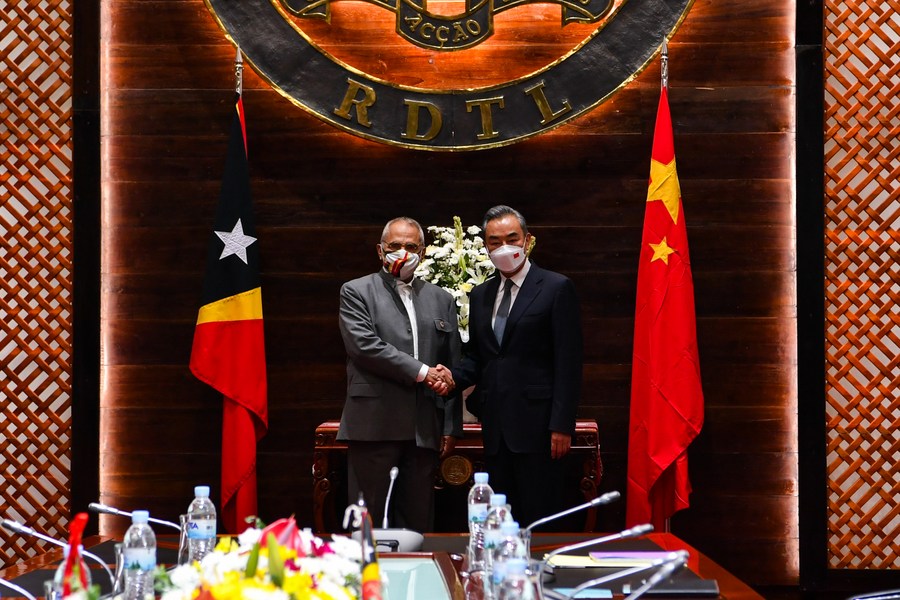Source: Xinhua News Agency

President of Timor-Leste Jose Ramos-Horta (L) meets with Chinese State Councilor and Foreign Minister Wang Yi in Dili, Timor-Leste, on June 4, 2022. (Xinhua/Xu Qin)
President Ramos-Horta said Timor-Leste fully supports the Belt and Road Initiative and other major initiatives proposed by China.
DILI, June 4 (Xinhua) -- President of Timor-Leste Jose Ramos-Horta and visiting Chinese State Councilor and Foreign Minister Wang Yi on Saturday expressed common willingness to strengthen regional cooperation and safeguard multilateralism.
During their meeting in Dili, the capital of Timor-Leste, Ramos-Horta said his country fully supports the Belt and Road Initiative and other major initiatives proposed by China. China's development benefits Timor-Leste greatly, and is of great significance to the region and the world.
Ramos-Horta thanked the Chinese government and people for their tremendous support in the past years, stressing that Timor-Leste has unswervingly adhered to the one-China policy since the establishment of diplomatic ties.
Timor-Leste is full of confidence and expectation for the future of bilateral relations, the president said.
For his part, Wang expressed appreciation to Ramos-Horta for signing the joint communique on establishing diplomatic ties with China on the day of independence in 2002 when he served as the first foreign minister of Timor-Leste.
Over the past 20 years, Wang said, China and Timor-Leste have treated each other as equals, understood each other and supported each other. Timor-Leste has become an important partner of the Belt and Road Initiative, and China has played a positive role in Timor-Leste's socio-economic development, infrastructure construction and improvement of people's lives.
Immediately after the COVID-19 outbreak, China sent medical supplies to Timor-Leste to help its fight against the pandemic. Chinese medical teams have benefited more than 300,000 people in the country. China has also taken an active part in the United Nations peacekeeping mission in Timor-Leste, Wang said.
China is ready to work with Timor-Leste to take the 20th anniversary of the establishment of diplomatic ties as an opportunity to review their successful experience and draw up a blueprint for the future, so as to elevate their comprehensive cooperative partnership to a new level and set an example of mutual respect, equality, mutual benefit and common development among countries of all sizes, Wang said.
Wang called for efforts to promote high-quality joint construction of the Belt and Road and initiate new landmark projects. China is willing to support Timor-Leste in enhancing its capability for self-development, accelerating its agricultural modernization and industrialization, and achieving diversified development, he said.
The Chinese side will continue to encourage Chinese enterprises to invest and start businesses in Timor-Leste, contributing to its development and revitalization, Wang added.
Both sides also reached consensus on strengthening regional cooperation.
Wang said China supports Timor-Leste playing an active role in regional and international affairs, and expects to see its early entry into the Association of Southeast Asian Nations, on which Ramos-Horta expressed gratitude for China's support as well as the hope that the long-cherished wish will come true at an early date.
Both sides pledged to uphold and safeguard multilateralism.
Wang said China expects Timor-Leste to take an active part in the China-proposed Global Development Initiative and Global Security Initiative, both of which have won widespread support.
Timor-Leste always sticks to its principles despite being a small nation, Ramos-Horta said, noting that his country advocates peaceful settlement of differences through dialogue and consultation as well as unity in responding to challenges facing international peace and security.
Wang is on a visit to Timor-Leste, the last leg of his Pacific tour starting from May 26, which has taken him to island countries of the Solomon Islands, Kiribati, Samoa, Fiji, Tonga, Vanuatu and Papua New Guinea.